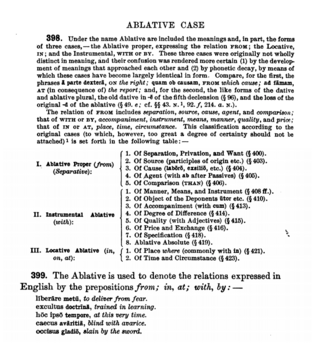Related Research Articles

In grammar, the ablative case is a grammatical case for nouns, pronouns, and adjectives in the grammars of various languages; it is sometimes used to express motion away from something, among other uses. The word "ablative" derives from the Latin ablatus, the (irregular) perfect, passive participle of auferre "to carry away".

Latin is a classical language belonging to the Italic branch of the Indo-European languages. Latin was originally a dialect spoken in Latium, the lower Tiber area around present-day Rome, but through the power of the Roman Republic it became the dominant language in the Italian region and subsequently throughout the Roman Empire. Even after the fall of Western Rome, Latin remained the common language of international communication, science, scholarship and academia in Europe until well into the 18th century, when other regional vernaculars supplanted it in common academic and political usage. For most of the time it was used, it would be considered a "dead language" in the modern linguistic definition; that is, it lacked native speakers, despite being used extensively and actively.
In grammar, the locative case is a grammatical case which indicates a location. It corresponds vaguely to the English prepositions "in", "on", "at", and "by". The locative case belongs to the general local cases, together with the lative and separative case.

Latin is a heavily inflected language with largely free word order. Nouns are inflected for number and case; pronouns and adjectives are inflected for number, case, and gender; and verbs are inflected for person, number, tense, aspect, voice, and mood. The inflections are often changes in the ending of a word, but can be more complicated, especially with verbs.
Prepositions and postpositions, together called adpositions, are a class of words used to express spatial or temporal relations or mark various semantic roles.
In grammar, the instrumental case is a grammatical case used to indicate that a noun is the instrument or means by or with which the subject achieves or accomplishes an action. The noun may be either a physical object or an abstract concept.

Dog Latin or cod Latin is a phrase or jargon that imitates Latin, often by "translating" English words into Latin by conjugating or declining them as if they were Latin words. Dog Latin is usually a humorous device mocking scholarly seriousness. It can also mean a poor-quality attempt at writing genuine Latin.

Latino sine flexione ("Latin without inflections"), Interlingua de Academia pro Interlingua (IL de ApI) or Peano's Interlingua (abbreviated as IL), is an international auxiliary language compiled by the Academia pro Interlingua under the chairmanship of the Italian mathematician Giuseppe Peano (1858–1932) from 1887 until 1914. It is a simplified version of Latin, and retains its vocabulary. Interlingua-IL was published in the journal Revue de Mathématiques in an article of 1903 entitled De Latino Sine Flexione, Lingua Auxiliare Internationale (meaning On Latin Without Inflection, International Auxiliary Language), which explained the reason for its creation. The article argued that other auxiliary languages were unnecessary, since Latin was already established as the world's international language. The article was written in classical Latin, but it gradually dropped its inflections until there were none.
Mutatis mutandis is a Medieval Latin phrase meaning "with things changed that should be changed" or "once the necessary changes have been made". It remains unnaturalized in English and is therefore usually italicized in writing. It is used in many countries to acknowledge that a comparison being made requires certain obvious alterations, which are left unstated. It is not to be confused with the similar ceteris paribus, which excludes any changes other than those explicitly mentioned. Mutatis mutandis is still used in law, economics, mathematics, linguistics and philosophy. In particular, in logic, it is encountered when discussing counterfactuals, as a shorthand for all the initial and derived changes which have been previously discussed.

Spanish pronouns in some ways work quite differently from their English counterparts. Subject pronouns are often omitted, and object pronouns come in clitic and non-clitic forms. When used as clitics, object pronouns can appear as proclitics that come before the verb or as enclitics attached to the end of the verb in different linguistic environments. There is also regional variation in the use of pronouns, particularly the use of the informal second-person singular vos and the informal second-person plural vosotros.
In French, articles and determiners are required on almost every common noun, much more so than in English. They are inflected to agree in gender and number with the noun they determine, though most have only one plural form. Many also often change pronunciation when the word that follows them begins with a vowel sound.
Missa cantata is a form of Tridentine Mass defined officially in 1960 as a sung Mass celebrated without sacred ministers, i.e., deacon and subdeacon.
In linguistics, case government is government of the grammatical case of a noun, wherein a verb or adposition is said to 'govern' the grammatical case of its noun phrase complement, e.g. in German the preposition für 'for' governs the accusative case: für mich 'for me-accusative'. Case government may modify the meaning of the verb substantially, even to meanings that are unrelated.

English prepositions are words – such as of, in, on, at, from, etc. – that function as the head of a prepositional phrase, and most characteristically license a noun phrase object. Semantically, they most typically denote relations in space and time. Morphologically, they are usually simple and do not inflect. They form a closed lexical category.
A Latin mnemonic verse or mnemonic rhyme is a mnemonic device for teaching and remembering Latin grammar. Such mnemonics have been considered by teachers to be an effective technique for schoolchildren to learn the complex rules of Latin accidence and syntax. One of their earliest uses was in the Doctrinale by Alexander of Villedieu written in 1199 as an entire grammar of the language comprising 2,000 lines of doggerel verse. Various Latin mnemonic verses continued to be used in English schools until the 1950s and 1960s.
Casally modulated prepositions are prepositions whose meaning is modified by the grammatical case their arguments take. The most common form of this type of preposition is bigovernate; that is the preposition may govern one of two cases.
Nulla dies sine linea is a Latin phrase meaning "no day without a line". The idea was originated by Pliny the Elder, where the idea applies to the Greek painter Apelles, who did not go a day without drawing at least one line. The phrase itself is attested for the first time in the Proverbiorum libellus by Polydore Vergil (1470-1555).
In Latin grammar, the ablative case is one of the six cases of nouns. Traditionally, it is the sixth case. It has forms and functions derived from the Proto-Indo-European ablative, instrumental, and locative. It expresses concepts similar to those of the English prepositions from; with, by; and in, at. It is sometimes called the adverbial case, since phrases in the ablative can be translated as adverbs: incrēdibilī celeritāte, "with incredible speed", or "very quickly".
Quenya is a constructed language devised by J. R. R. Tolkien, and used in his fictional universe, Middle-earth.
Latin syntax is the part of Latin grammar that covers such matters as word order, the use of cases, tenses and moods, and the construction of simple and compound sentences, also known as periods.
References
- 1 2 Ablative case review, Clifford Broeniman, Latin 1, Maggie L. Walker Governor's School for Government and International Studies. Accessed on line December 23, 2007.
- 1 2 Ridgewood High School Latin I Curriculum- 12/05. Accessed on line December 23, 2007.